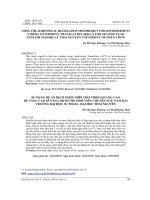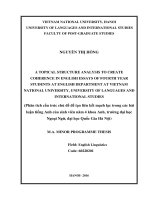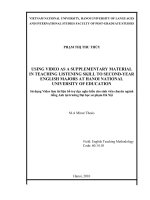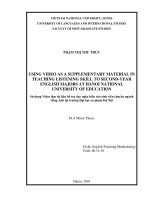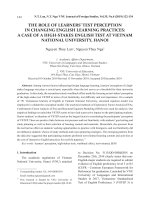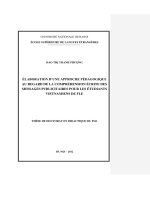Factors affecting learning english listening skills of english majors at vietnam national university of agriculture
Bạn đang xem bản rút gọn của tài liệu. Xem và tải ngay bản đầy đủ của tài liệu tại đây (536.86 KB, 45 trang )
VIET NAM NATIONAL UNIVERSITY OF AGRICULTURE
FACULTY OF EDUCATION AND FOREIGN LANGUAGES
BA THESIS
FACTORS AFFECTING LEARNING ENGLISH
LISTENING SKILLS OF ENGLISH MAJORS AT
VIETNAM NATIONAL UNIVERSITY OF
AGRICULTURE
CÁC YẾU TỐ ẢNH HƯỞNG ĐẾN VIỆC HỌC KỸ
NĂNG NGHE TIẾNG ANH CỦA SINH VIÊN NGÔN
NGỮ ANH TẠI HỌC VIỆN NÔNG NGHIỆP VIỆT NAM
Student
: NGUYEN THI HONG NHUNG
Student code
: 621223
Major
: ENGLISH LINGUISTICS
Supervisor
: TRAN THANH PHUONG, M.A
Hanoi – 2021
VIET NAM NATIONAL UNIVERSITY OF AGRICULTURE
FACULTY OF EDUCATION AND FOREIGN LANGUAGES
BA THESIS
FACTORS AFFECTING LEARNING ENGLISH
LISTENING SKILLS OF ENGLISH MAJORS AT
VIETNAM NATIONAL UNIVERSITY OF
AGRICULTURE
CÁC YẾU TỐ ẢNH HƯỞNG ĐẾN VIỆC HỌC KỸ
NĂNG NGHE TIẾNG ANH CỦA SINH VIÊN NGÔN
NGỮ ANH TẠI HỌC VIỆN NÔNG NGHIỆP VIỆT NAM
Student
: NGUYEN THI HONG NHUNG
Student code
: 621223
Major
: ENGLISH LINGUISTICS
Supervisor
: TRAN THANH PHUONG, M.A
Hanoi – 2021
CERTIFICATE OF ORIGINALITY
I certify that the project titled “FACTORS AFFECTING LEARNING
ENGLISH LISTENING SKILLS OF ENGLISH MAJORS AT VIETNAM
NATIONAL UNIVERSITY OF AGRICULTURE” has not previously been
submitted for a degree nor has it been submitted as part of requirements for a
degree except as fully acknowledged within the text.
I also certify that the thesis has been written by me. Any help that I have
received in my research work and the preparation of the thesis itself has been
acknowledged. In addition, I certify that all information sources and literature
used are indicated in the thesis.
Hanoi, 2021
Nguyen Thi Hong Nhung
Approved by
SUPERVISOR
(Signature and full name)
Date:……………….
i
ACKNOWLEDGEMENT
It is impossible to finish a research project without assistance. During my
study, I received a lot of assistance from my teachers and friends.
First and foremost, I want to express my heartfelt gratitude to my
supervisor, Ms. Tran Thanh Phuong. Her constant advice and kind support
helped me get through the process of finishing my thesis. Her suggestions have
made a huge difference in the quality of my work. The thesis would have been
difficult to complete without her motivation and instructions.
Next, I am grateful for Ms. Nguyen Thi Thu Thuy's supportive
suggestions and advice, as well as all of the Foreign Language Department
teachers who assisted me in the study.
I'd like to express my gratitude to all of the students who participated in
the survey and interview. This is also a key element in completing my study.
Finally, I'd like to give thanks to all of my friends who helped me as I
worked on my thesis. Their kind help, concern, and encouragement gave me
courage and helped me overcome all of my difficulties.
Thank you very much.
Sincerely.
ii
TABLE OF CONTENTS
CERTIFICATE OF ORIGINALITY
i
ACKNOWLEDGEMENT
ii
TABLE OF CONTENTS
iii
ABSTRACT
v
LIST OF TABLES
vi
PART I: INTRODUCTION
1
1.RATIONALE FOR THE STUDY
1
2. AIMS AND OBJIECTIVES OF THE STUDY
2
2.1. Aims of the study
2
2.2. Objectives of the study
2
3. RESEARCH QUESTIONS
2
4. SCOPE OF THE STUDY
3
5. SIGNIFICANCE OF THE STUDY
3
6. DESIGN OF THE STUDY
3
PART II: DEVELOPMENT
5
CHAPTER 1: LITERATURE REVIEW
5
1.1. REVIEW OF THE PREVIOUS STUDIES (AT HOME & ABROAD)
5
1.1.1. Review of the previous study: At home
5
1.1.2. Review of the previous study: Abroad
6
1.2. REVIEW OF THEORETICAL BACKGROUND
6
1.2.1. Definitions of listening
6
1.2.2. Types of listening
8
1.3. THE IMPORTANCE OF LISTENING SKILLS
8
1.4. TEACHING LISTENING SKILLS
9
1.4.1. Pre-listening activities
10
1.4.2. while-listening activities
10
1.4.3. Post-listening activities
11
iii
1.5. LISTENING COMPREHENSION PROBLEMS
11
CHAPTER 2: METHODOLOGY
13
2.1. RESEARCH METHODOLOGY
13
2.2. RESEARCH SETTING
13
2.3. DATA COLLECTION
13
2.3.1. Data collecting instruments
13
2.3.2. Data collecting procedures
14
2.4. DATA ANALYSIS
14
CHAPTER 3: FINDINGS AND DISCUSSIONS
16
3.1. SOME VIEWPOINTS ON LEARNING THE LISTENING SKILLS OF
STUDENTS
16
3.2. OBJECTIVE FACTORS
17
3.3. SUBJECTIVE FACTORS
19
3.4. METHODS OF STUDENTS‟ LEARNING LISTENING SKILLS
20
3.5. RESULTS FROM INTERVIEWS
22
3.6. SUGGESTIONS FOR IMPROVING ENGLISH LISTENING SKILLS
23
3.7. SUMMARY
24
PART III: CONCLUSION
25
1. RECAPITULATION
25
2. LIMITATION OF THE STUDY
28
3. RECOMMENDATIONS FOR FURTHER RESEARCH
29
REFERENCE
30
APPENDICES
33
Appendix 1
33
Appendix 2
36
iv
ABSTRACT
One of the most important qualities for communicating in everyday life is
the ability to listen. It is becoming increasingly important to learn this skill while
studying a foreign language. We all know that listening to a message entails
more than just hearing it, so students must comprehend the information and
correctly respond to it. The thesis would look at factors affecting learning
English listening skills of English majors at the Vietnam National University of
Agriculture. As a result, I conducted the study using both qualitative and
quantitative approaches. As a consequence, questionnaires and interviews were
used to gather data for the analysis. The findings of the study will support
English majors in improving their listening skills. More specifically, the
research aids me in finding factors that affect learning English listening skills so
that I can suggest effective solutions to the issues in the hopes of strengthening
students' listening skills.
v
LIST OF TABLES
Table 3.1: Students‟ viewpoints
16
Table 3.2: Objective factors
18
Table 3.3: Subjective factors
19
Table 3.4 : Listening learning methods
21
vi
PART I: INTRODUCTION
1.RATIONALE FOR THE STUDY
Currently, English is a commonly used language all over the world, such
Vietnam, China, India, Australia, etc. Nevertheless, listening skills have been
underemphasized in the English learning process at most Vietnamese schools
(Duong & Chau, 2019; Nguyen & Thai, 2018). Because English is a foreign
language in Vietnam, English students did not have the opportunity to practice
outside of the classroom. Due to lack of time, teachers did not have enough time
in the classroom to allow students to practice their skills (Nguyen, 2013). As a
result, after years of learning English, university graduates are unable to
communicate (Le, 2013).
Listening plays an important role in communication as it is said that, of
the total time spent on communicating, listening takes up 40-50%; speaking, 2530%; reading, 11-16%; and writing, about 9% (Mendelsohn, 1994). Listening
involves an active process of deciphering and constructing meaning from both
verbal and non-verbal messages (Nunan, 1998). People who want to
communicate well need flexible use of language skills. when learning a foreign
language, people usually want to be engaged in real communication with those
who speak the target language; thus, they have the need to understand what
others say and to be understood. Listening skill, which plays an important role
not only in communication but also in interpersonal relationships. Listening skill
can only be improved by hard work and repetition as it is the case in reading
skill (Bostrom, 1990, Brody, 2004; Kutlu and Aslanoglu, 2008).
Listening skills can be considered as the most important of the four skills:
listening, speaking, reading and writing. We can communicate fluently only
when we hear and understand what others are saying, which is also the most
1
important thing when learning a language. In addition, if we cannot hear or only
hear a certain part, communication becomes more difficult and sometimes we
will miss important information to hear. Besides, to listen effectively, it takes a
lot of concentration and practice for a long time. This can make students feel
bored.
Learning listening skills has become difficult for English majors. When
equipment, such as radios, isn't improved, or the speaker's voice isn't clear.
Students get disinterested in listening skills as a result of this.
In conclusion, I would like to present the thesis title : “ Factors affecting
learning English listening skills of English majors at Vietnam National
University of Agriculture” and to suggest some possible solutions to improve
the current situation for several reasons. Furthermore, this is also quite a difficult
skill for students. Most students feel it boring to learn listening skills, so I chose
this topic to study.
2. AIMS AND OBJIECTIVES OF THE STUDY
2.1. Aims of the study
This research aims to investigate the factors affecting learning English
listening skills of English majors at Vietnam National University of Agriculture.
2.2. Objectives of the study
The objective of this study is to identify the factors affecting learning
English listening skills of English-majored students at the Vietnam National
University of Agriculture, then give some solutions to help students learn
English listening skills better.
3. RESEARCH QUESTIONS
The focus of this research was to understand more about the factor that
affect listening skills. The project's research questions were as follows:
1.What are the factors affecting English majors‟ learning English listening skills
at the Vietnam National University of Agriculture?
2
2.What are suggestions for improving English majors‟ learning English listening
skills at Vietnam National University of Agriculture?
4. SCOPE OF THE STUDY
The scope of the study randomly selected 60 first-year students (K65) and
60 second-year students (K64) in English majors at the Vietnam National
University of Agriculture. The study began on March 1, 2021 and will end on
July 1, 2021.
5. SIGNIFICANCE OF THE STUDY
Listening skills play an important role in learning English today. Most
students believe that listening is a difficult skill among the four skills of
listening, speaking, reading, and writing. It may be a skill that they must spend
more time learning and it makes them feel boring. Therefore, through the results
of this study, students will have an overview of the importance and role of
listening skills in life, and can apply learning methods to improve their listening
skills.
For the researchers, the investigation will uncover important factors that
affect a student's listening skills in general that many research groups have not
found out.
6. DESIGN OF THE STUDY
Except for the acknowledgement, abstract, references, and appendices,
this research was conducted in three main parts:
the introduction, the
development and the discussion.
Part 1: INTRODUCTION: It explains why this thesis' topic was chosen, as well
as the study's aims, scope, methods, research questions, and design.
Part 2: DEVELOPMENT: which consists of three chapters:
Chapter 1: Literature Review - presents the theoretical background related to the
definition of listening, the importance of listening skills and types of listening.
3
Chapter 2: Methodology – gives the research methods, research setting/ context,
data collection, and data analysis.
Chapter 3: Findings and Discussion - presents the survey's complete results as
well as a detailed analysis of the data collected.
Part 3: CONCLUSION - which presents the review of the study, suggestions for
further research and limitations of the study.
4
PART II: DEVELOPMENT
CHAPTER 1: LITERATURE REVIEW
1.1. REVIEW OF THE PREVIOUS STUDIES (AT HOME & ABROAD)
1.1.1. Review of the previous study: At home
Two foreign grammar teachers, Nguyen Bang and Nguyen Ba Ngoc
(2002) also listed the following 6 difficulties: (1) Difficulty with English sounds,
(2) Must understand all words, (3) Unable to understand when the British speak
naturally quickly (4) Find it difficult to keep up with the speed of English
speaking, (5) Need to listen to it over and over again, (6) Tired and disappointed.
Do Quang Viet (2007) points out that phonetics, vocabulary, grammar,
and pragmatics factors are some of the difficulties in the process of listening to
and understanding foreign languages in general, and French in particular.
The authors Hoang Van Van, Nguyen Thi Chi, and Hoang Thi Xuan Hoa
(2006) in their book 'Đổi mới phương pháp dạy tiếng Anh ở Trung học Phổ
thông Việt Nam' mentioned the following difficulties in the process of learning
audiovisual skills from the learner's point of view: (1) Difficulty listening to
English sounds, (2) Need to understand all of the words to grasp the speaker's
intention, (3) Can't understand native speakers when they speak naturally
quickly, (4) Need to listen again and again, (5) Finding it difficult to grasp all of
the information and not predicting what will come next, (6) Lack of
concentration when listening.
In summary, according to the academics mentioned above, learners often
face the following difficulties when listening: (1) Inability to recognize English
sounds, (2) limited vocabulary, (3) lack of concentration when listening, (4)
difficulty grasping the main idea of the listening task, (5) need to listen many
times, and (6) inability to keep up with the speaker's speed.
5
1.1.2. Review of the previous study: Abroad
According to Ur, P. (1996), author of many language teaching books,
children often encounter the following difficulties while learning to listen: (1)
Not recognizing sounds the British say, (2) Have a habit of understanding all the
words in a sentence in order to understand the content of the article, (3) Unable
to understand when the British speak naturally quickly, (4) It is necessary to
listen a lot (5) Find it difficult to grasp all the information and fail to predict
what the speaker is about to say, (6) If they listen for a long time, they will feel
tired and lack of concentration.
Author Ella A.Erway (1984) mentions factors affecting the listening
comprehension process, from the most important factors to the less important
factors. At the same time, he also removes factors that do not affect the listening
comprehension process.
In summary, as researchers have discovered, a variety of factors affect
listening, including content, vocabulary, pronunciation, tone, and external
factors, etc.
1.2. REVIEW OF THEORETICAL BACKGROUND
1.2.1. Definitions of listening
Listening is an act in which one hears something attentively with high
concentration. According to researchers, we spend approximately 45% of our
time listening. We listen more than we speak. Listening is difficult, because
human minds tend to be easily distracted. A person who can control their mind
and listen attentively gains a variety of other skills and benefits.
Listening skill can be defined as, “Listening is the act of hearing
attentively”. It is also a process similar to reading which should possess
knowledge of phonology, syntax, semantics and text understanding. Thomlison
(1984) defines listening as, “Active listening, which is very important for
6
effective communication”. Listening can be also defined as, “More than just
hearing and to understand and interpret the meaning of a conversation”.
Anderson and Lynch (1988) argues that what is successful listening,
understanding is not something that happens because of what a speaker says: the
listener has a crucial part to play in the process, by activating various types of
knowledge, and by applying what he knows to what he hears and trying to
understand what the speaker means"(p.6).
Underwood (1989) simplifies the definition of listening to "the activity of
paying attention to and trying to get meaning from something we hear" (p. 1).
Mendelsohn (1994) defines listening comprehension as “the ability to
understand the spoken language of native speakers”. According to Mendelsohn
(1994), in listening to spoken language, the ability to decipher the speaker„s
intention is required of a competent listener, in addition to other abilities such as
processing the linguistic forms like speech speed and fillers, coping with
listening in an interaction, understanding the whole message contained in the
discourse, comprehending the message without understanding every word, and
recognizing different genres. Listeners must also know how to process and how
to judge what the illocutionary force of an utterance is-that is, what this string of
sounds is intended to mean in a particular setting, under a particular set of
circumstances - as an act of real communication (Mendelsohn, 1994).
Purdy (1997) defines listening as "the active and dynamic process of
attending, perceiving, interpreting, remembering, and responding to the
expressed (verbal and nonverbal), needs, concerns, and information offered by
other human beings" (p. 8).
On the whole, all of the authors above believe that listening is a process of
hearing and comprehending a language, allowing people to communicate more
easily with others.
7
1.2.2. Types of listening
According to some authors, namely Nguyen Thi Van Lam and Ngo Dinh
Phuong (2006), there are two ways of listening in the real life. They are casual
listening and focused listening depending on the purpose of listening.
One type of listening, casual listening, means listening without a
particular purpose. When we listen, we do not pay much or even any attention to
the information unless there is something that interests us. Therefore, we hardly
remember the content of what we hear. Normally, we do this kind of listening
when we listen to music, or listen to news on the radio or TV while doing some
housework or chatting to a friend.
Another type of listening is focused listening. That is when we listen for a
particular purpose to find out information we need to know. It happens quite
popularly in the real life. In here, we listen with much more concentration and
try to get as much information as possible. However, we do not listen to every
word. We know beforehand what we are going to listen so we only catch the
most important information from the speech or the lecture. In classroom,
learners also use this type of listening.
In brief, according to the above two authors, there are two main types of
listening. One type of listening is casual listening and another type of listening is
focused listening. When we are casually listening, we do not have to pay
attention to uninteresting information; however, when we are focused on
listening, we must listen to and understand the important words in order to
correctly answer the question.
1.3. THE IMPORTANCE OF LISTENING SKILLS
In real life, most people listen more than they speak, read, or write. We
pay attention everywhere and at all times. All and everybody is heard by us. For
example, at home, we could listen to the radio, watch a movie, or discuss things
with others. Students pay attention in class to what the lecturers are saying. The
8
staff attends a meeting to listen to the director's new plan, etc. In real life, it
stands to reason that listening is important.
The listening skill has a vital role in developing foreign language
competence. Nunan (1998) believes that listening is the basic skill in language
learning. Without listening skills, learners will never learn to communicate
effectively. In fact, over 50% of the time that students spend functioning in a
foreign language should be devoted to listening (Nunan, 1998). Numerous
studies indicated that efficient listening skills were more important than reading
skills as a factor contributing to academic success (Coakley & Wolvin, 1997;
Truesdale, 1990). However, Dunkel's (1991b) study reported that international
students' academic success in the United States and Canada relied more on
reading than listening comprehension, especially for those students in
engineering, psychology, chemistry, and computer science. As a result, listening
has received less attention in school education than reading and writing.
Nonetheless, it is clear that listening is an important part of everyone's life.
Because listening is used as a primary medium of learning at all levels of school,
it is much more important in students' lives.
In closing, all of the researchers agree that listening is a difficult and
important skill, which we must spend a significant amount of time practicing.
1.4. TEACHING LISTENING SKILLS
Listening is a complex problem-solving activity in which listeners engage
with a speaker to construct meaning based on their own experiences and
knowledge (Barnes, 1984). Students are more likely to identify their own
listening abilities and participate in activities that prepare them to be effective
listeners if they are made aware of the factors that affect listening, the levels of
listening, and the components of the listening process. Karakas (2002) states that
listening activities attempt to prevent failure so that the learner's interpretation of
9
the text can be supported. Pre-listening, while-listening, and post-listening
activities are the most common types of listening activities.
1.4.1. Pre-listening activities
The effectiveness of pre-listening activities, such as creating a plan for
listening to the text and teaching cultural important concepts, is well supported
by schema theory. The listening teacher may choose key words, difficult
grammatical structures, and expressions to explain during the topic discussion,
and may also ask students to guess the content or what speakers will say based
on the information they have previously received. The two primary goals of this
activities are to help to activate students„ prior knowledge, build up their
expectations for the coming information and to provide the necessary context for
the specific listening task. A listening comprehension practice, such as two
persons conversing about their everyday routines, might be followed by the
teacher. Based on the previous listening activity, students must answer true or
false questions.
1.4.2. while-listening activities
Listeners who actively participate in the listening experience are more
likely to construct clear and accurate meaning as they analyze the speaker's
verbal message and nonverbal signals. Students check and revise their
predictions during the listening experience. Based on what they heard, people
create inferences and judgements. A listening teacher may instruct students to
write down key words in order to deduce the text's main points. While listening
to the material, students answer comprehension questions and choose specific
information to complete the table provided with the text. Following that, an
open-ended exercise may be used to allow students to improve listening
comprehension in class as talking about their ordinary activities and asking for
more information. Students should start with what they already know about
10
listening comprehension so that they may build on their existing knowledge and
skills with exercises based on the same idea.
1.4.3. Post-listening activities
The importance of post-listening activities is that they help students
improve their listening skills. Post-listening activities work best when done right
after the listening session. Students may relate what they've heard to their own
thoughts and experiences through well-planned post-listening activities, and
encourage interpretive and critical listening as well as reflective thinking.
Teachers can also use post-listening activities to assess and check students'
comprehension, confirm their understandings, to extend comprehension beyond
the literal level to the interpretive and critical levels.
1.5. LISTENING COMPREHENSION PROBLEMS
Listening comprehension is a crucial skill in the acquisition of a language,
and it is also one of the most difficult for students to master. Learners may
experience some difficulty in exchanging information orally if they are not good
at listening (Rost, 2002; Underwood, 1989).
In the same vein, one of the factors negatively affecting learners‟
communicative competence is their poor listening ability (Anderson & Lynch,
2003; Nguyen & Tran, 2015; Ur, 1996).
Yagang (1994) states that problems in listening were accompanied with
four following factors: the message, the speaker, the listener and the physical
setting. When it comes to content, many students find it difficult to listen to a
recording message because many topics are new to them. It is not possible to
listen to messages on the radio or on tape at a slower speed. Even in dialogue,
asking the speaker to repeat something as many times as the listener wants is
difficult. In many cases, listeners cannot predict what the speakers are going to
say.
11
Underwood (1989) indicates that there were seven causes affecting
efficient listening comprehension. He said “the greatest difficulty with listening
comprehension for many English language learners is they cannot control how
quickly a speaker speaks”. The first problem is that the learners have no control
over the speaker's speaking speed. Second, it is difficult for students to have
words repeated, it is hard for the teacher to judge whether or not the students
have understood any particular section of what they have heard (Underwood,
1989, p. 17). Third, listeners have a limited, listeners may come across an
unfamiliar vocabulary that causes them to pause and think about meaning of
those words, causing them to miss the next part of the speech. Fourth, it is hard
for listeners to recognize the signals which indicate that the speaker is moving
from one point to another. Fifth, listeners may lack contextual knowledge. Sixth,
it can be difficult for listeners to concentrate in a foreign language. Seventh,
certain learning habits such as understanding every word is also one of factors
make learners fail in listening comprehension.
After all, many factors such as the speaker, the content, the listener, and
the environment affect listening comprehension. Therefore, it requires the
strategies to increase the learning process.
12
CHAPTER 2: METHODOLOGY
2.1. RESEARCH METHODOLOGY
Quantitative descriptive techniques were used in this research. As a result,
the focus of this thesis was to identify the factors that affect the listening skills
of first-year and second-year English majors at the Vietnam National University
of Agriculture.
2.2. RESEARCH SETTING
The study was randomly conducted with 60 first-year students (K65) and
60 second-year students (K64) in English majors at the Vietnam National
University of Agriculture.
2.3. DATA COLLECTION
2.3.1. Data collecting instruments
In this study, there were two instruments used to collect data, namely a
survey questionnaire and an interview.
The survey questionnaire:
The researcher uses the results of this questionnaire to conduct data
analysis. This questionnaire include questions related to variables that would be
considered to affect listening skills (related to students themselves, school,...).
The questionnaire has 22 questions that measure students' opinions of
listening skills as well as factors that make learning listening skills difficult for
them and methods students used to learn listening skills. Therefore, the Likert
scale was used in this study, students show their ideas by checking only one
column for each statement according to the five - degree scale, namely (1)
strongly disagree, (2) disagree, (3) neutral, (4) agree, and (5) strongly agree.
The interview:
13
An interview was conducted with 12 first-year and second-year students
in English majors at the Vietnam National University of Agriculture. However,
due to Covid-19, the researcher was unable to interview all 12 students.
The interview consisted of two questions, covered about five minutes, and
included six students, three first-year (K65) and three second-year students (K64)
in English majors.
This study collected students‟ ideas about the factors affecting learning
English listening skills and gave suggestions to improve them. After the
interview, the researcher analyzed the data based on the interview results.
2.3.2. Data collecting procedures
The study's data was collected from English majors at the Vietnam
National University of Agriculture. The researcher sent 120 questionnaires to
120 students in order to get information on learning English listening skills
(randomly selected 60 first-year students and 60 second-year English majors to
survey. In addition, 12 other students were invited to participate in the interview
process. Questionnaires and interviews were used to present the findings.
After creating the desired questionnaire, the researcher gave it to the first
and second-year English majors at the Vietnam National University of
Agriculture. Before delivering the questionnaire sheets, the researchers clearly
explained the study's aim and offered detailed instructions on how to answer the
items.
In addition to the questionnaire, students were interviewed about the
difficulties they faced while learning listening skills. These tools are used in
quantitative research that aims to collect data from specific scenarios.
2.4. DATA ANALYSIS
Data was gathered using two main methods. First, students answer all of
the questionnaire's questions. The answers were categorized according to the
five - degree scale, namely: “strongly disagree”, “disagree”, “neutral”, “agree”
14
and “strongly agree” (1 to 5 are the numbers that correlate to them). Following
that, the students' answers to the questionnaire and the factors affecting listening
skills were analyzed by using descriptive statistics in the SPSS software.
This software helps the researcher in calculating the mean and standard
deviation of the above five-degree scales, allowing them to know which of the
five-degree scales most students choose, “ agree” or “ disagree”.
15
CHAPTER 3: FINDINGS AND DISCUSSIONS
3.1. SOME VIEWPOINTS ON LEARNING THE LISTENING SKILLS OF
STUDENTS
First, the students' attitudes and opinions about learning English listening
skills. Table 3.1, it shows that most students agreed that they need a lot of time
to learn listening skills (mean=3.65) and listening is the most difficult of the four
skills (mean=3.46).
Next, learning listening skills is very boring (mean=3.45). Regarding the
importance of listening skills (mean=3.25). Listening is the best skill of the four
skills (mean=2.67) and they like to learn listening most (mean=2.53). Except
that students like to learn listening to the most and that listening is their best
skill out of the four (mean < 3.00), all values of the remaining variables exceed
the crucial value (mean value, mean > 3.00). This shows that most students
disagreed with the idea that students like to learn listening to the most and that
listening is their best skill, and most students agree with the remaining points.
Table 3.1: Students’ viewpoints
N
Minimum Maximum
Mean
Std.
Deviation
Among
the
four
skills, I like to learn
120
1.00
4.00
2.53
0.879
120
1.00
4.00
2.67
0.790
listening most.
Listening is my best
skill
of
the
four
skills.
16
N
Minimum Maximum
Mean
Std.
Deviation
Listening is, in my
opinion,
the
most
difficult of the four
120
2.00
5.00
3.46
0.897
120
2.00
5.00
3.65
0.795
120
2.00
5.00
3.25
0.872
120
2.00
5.00
3.45
0.818
skills.
I need a lot of time to
learn listening skills.
In my opinion, the
most important skill
is listening.
Learning
listening
skills is very boring.
Valid N (listwise)
120
Listening is a difficult skill for many students, maybe due to
pronunciation, knowledge, grammar,etc, or because the teaching method does
not attract students, causing many students to lose concentration on their studies,
making this skill more difficult.
All in all, each student has their point of view, but the majority of them
belive that listening is a difficult skill to learn, which makes them to become
bored with learning listening skills.
3.2. OBJECTIVE FACTORS
Descriptive statistics in table 3.2, it shows that the mean value of the five
variables, which are the objective factors influencing the English listening skills
at the Vietnam National University of Agriculture. As shown in the table, the
most difficult factor for students is that native speakers talk too quickly
17




